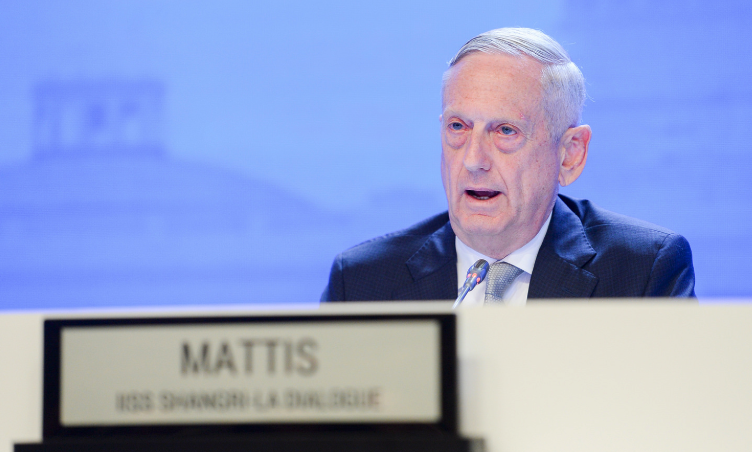The United States and China appear to be headed for a military collision in the Southeast Asia region, as Washington warns of a more powerful military response to the increased weaponization of the heavily disputed islands in the South China Sea.
Speaking at the IISS Shangri-La Dialogue, a civilian and military defense summit in Singapore, U.S. Secretary of Defense James Mattis blasted Beijing Saturday morning for the militarization of artificial islands in the South China Sea and warned there could be “much larger consequences” in the near term.

IISS Shangri-La Dialogue 2018 – James N. Mattis delivers opening plenary speech. (Source: IISS)
“There are consequences that will continue to come home to roost if China does not find a way to work more collaboratively with nations that have interests in the disputed region,” Mattis said, while he addressed ministers and high-ranking delegates from over 50 countries. During the entirety of the speech, Mattis did not define what exactly those consequences would be.
The Wall Street Journal said Mattis’ warning to Beijing, was in direct response to a question from an audience member, which he responded by saying, “despite China’s claims to the contrary, the placement of these weapons systems is tied directly to military use for the purposes of intimidation and coercion,” adding that “China’s militarization of the Spratlys is also in direct contradiction to President Xi Jinping’s 2015 public assurances in the White House Rose Garden that they would not do this.”
IISS Shangri-La Dialogue 2018 – James N. Mattis delivers opening plenary speech. (Source: IISS)
Beijing’s deployment of anti-ship cruise missiles, radar-jamming equipment, and strategic bombers to the disputed islands have dramatically increased geopolitical tensions around the region. Mattis said such action forced Washington to rethink its “cooperative stance” and disinvite China from the biennial Rim of the Pacific military exercise, expected to start in June.
Mattis acknowledged that Beijing’s penalty for militarization in the disputed islands has been relatively small, considering the vast amounts of global shipping lanes that pass by the islands.
The defense secretary added, “I believe there are much larger consequences in the future when nations lose the rapport of their neighbors when they believe that piling mountainous debts on their neighbors and somehow removing the freedom of political action is the way to engage with them.”
#SecDef Mattis discusses US leadership and #IndoPacific security challenges during the #ShangriLaDialogue June 2. The #ShangriLa Dialogue, held by the @IISS_org, is an inter-governmental security forum attended by defense ministers and delegates from more than 50 nations. #SLD18 pic.twitter.com/o1VK4UKiSE
— U.S. Dept of Defense (@DeptofDefense) June 2, 2018
There is a reason to believe that Mattis is referring to China’s One Belt One Road Initiative where Beijing has used large amounts of debt to gain political leverage over developing countries for infrastructure projects.
“Eventually these things do not pay off, even if on the financial ledger sheet, or the power ledger sheet they appear to,” he said. “It’s a very shaky foundation when we believe that militarizing features are somehow going to endorse their standing in the world.”
James Mattis: US leadership and the challenges of Asia-Pacific security


